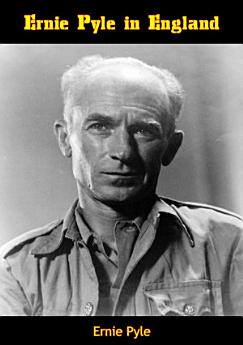Ernie Pyle in England
About this ebook
Ernie Pyle in England, first published in 1941, is the account of the journalist’s stay in England, Scotland and Wales during the height of the German bombing blitz on London and other cities of the United Kingdom.
Pyle, one of the most famous correspondents of the Second World War, had an easy-going, folksy-style of writing, making the book an enjoyable yet informative read about the conditions he encountered. His descriptions of the effects of the bombing, nights spent in air raid shelters, food- and gas-rationing, and daily life in London remain classic pieces of war-time reporting.
Ratings and reviews
About the author
Ernest Taylor Pyle (August 3, 1900 - April 18, 1945) was a Pulitzer Prize-winning American journalist. As a roving correspondent for the Scripps-Howard newspaper chain, he earned wide acclaim for his accounts of ordinary people in rural America, and later, of ordinary American soldiers during World War II. His syndicated column ran in more than 300 newspapers nationwide. Pyle was born near Dana, Indiana and, after attending local schools, he joined the U.S. Navy Reserve during World War I at age 17. He served three months of active duty until war end, then finished his enlistment in the reserves and was discharged with the rank of Petty Officer Third Class. After the war Pyle attended Indiana University, editing the Indiana Daily Student newspaper and traveling to the Orient with his fraternity brothers of Sigma Alpha Epsilon. With only a semester left he quit to accept a job at a newspaper in LaPorte, Indiana. He worked there for three months before moving to Washington, D.C., where he served as a reporter for the tabloid newspaper, The Washington Daily News. In 1932, Pyle was named managing editor and served in the post for three years. From 1935 through 1941 he traveled throughout the United States, writing about rural towns and their inhabitants. After the U.S. entered World War II, he lent the same distinctive, folksy style to his wartime reports, first from the home front, and later from the European and Pacific theatres. On April 18, 1945, he was killed by enemy fire on Iejima during the Battle of Okinawa. At the time of his death he was among the best-known American war correspondents. He won the Pulitzer Prize in 1944 for his spare, poignant accounts of “dogface” infantry soldiers from a first-person perspective. “No man in this war has so well told the story of the American fighting man as American fighting men wanted it told”, wrote Harry Truman. “He deserves the gratitude of all his countrymen.”






